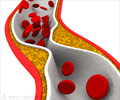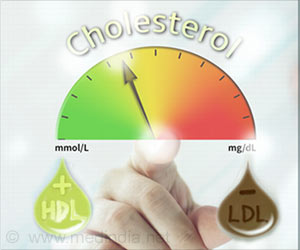A 20-year study has found that young people with even modestly elevated cholesterol levels are more likely to develop coronary artery calcium and atherosclerosis later in life.

The findings refute the common assumption that non-optimal cholesterol levels are insignificant during young adulthood and suggest a stronger emphasis on early lifestyle intervention, according to Mark J. Pletcher, who is first author on the study.
"We don't usually worry too much about heart disease risk until a person is in middle age because it's rare to have a heart attack in young adulthood," said Pletcher, who is an associate professor of Epidemiology and Biostatistics and of Medicine at UCSF.
"However, our evidence shows that young adulthood is an important time because lasting damage already starts to accumulate at this age. In order to prevent heart disease and stroke more effectively, we should be thinking about cholesterol at a younger age," Pletcher added.
The study followed 3,258 men and women aged 18 to 30 for two decades with repeated measurements of low- and high-density lipoprotein (LDL and HDL) cholesterol and triglycerides (fat molecules in the blood).
Coronary artery calcium, which is indicative of atherosclerotic plaque buildup in the coronary arteries, was measured by a CT scan at the end of follow-up when participants were about 45 years old.
Advertisement
For example, 44 percent of study participants with an average LDL cholesterol level greater than 160 mg/dL had calcifications in their coronary arteries two decades later, compared to only eight percent of participants with optimal LDL levels less than 70 mg/dL.
Advertisement
Participants were part of the Coronary Artery Risk Development in Young Adults study (known as CARDIA), which began in 1985 and involved healthy, young men and women of various backgrounds from four American cities. The study population was 47 percent African American and 56 percent female.
Atherosclerosis, or blockages in the coronary artery from cholesterol and plaque, can lead to heart attack and stroke.
The findings have been published August 2, 2010 in the Annals of Internal Medicine.
Source-ANI













